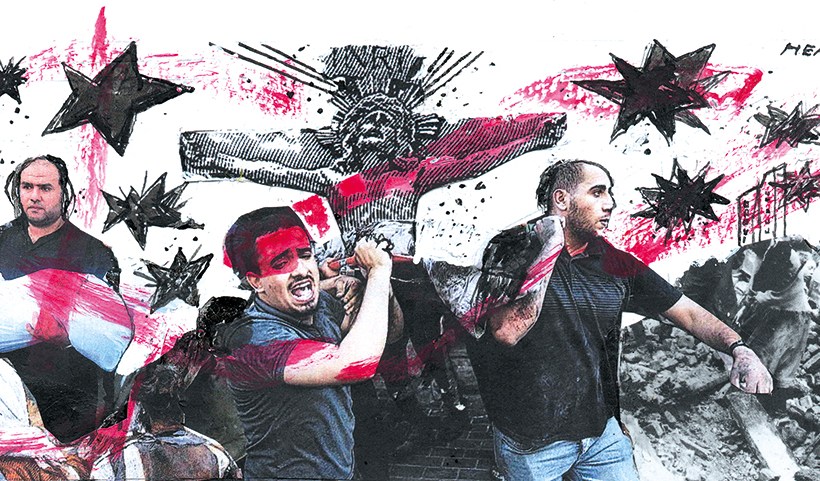Six weeks ago, I invited Ahmed Alnaouq, a young diplomat who recently joined the Palestinian mission in London, to stay for a cricket weekend in Wiltshire. He resisted all entreaties to play the game but was in every other way a delightful guest. On Sunday, Ahmed learnt that his family in Gaza has been wiped out by an Israeli bomb. His father, siblings, and more than 15 nieces and nephews had all been killed. Twenty-three dead, no injuries. Another brother was killed by an Israeli bombing in 2014. His mother died three years ago because, he says, Israel denied her medical treatment. When I sent him a text message saying that he and his family were in my thoughts and prayers – it felt hopeless, but what else can one say? – he replied: ‘My family is gone Peter. All of them. My father, brothers and sisters and all their children. Everyone is gone.’ The Gaza health ministry says the death toll from the Israeli bombing is now over 5,000, more than 2,000 of whom are children. Those who die at once are fortunate. Many endure slow deaths crushed in the rubble. Gazans write their names on their limbs as a precaution so that when their bodies are found they can be identified.
Many Palestinians outside Gaza live in fear. In some areas they dare not speak Arabic in the street. The police tour the streets entering shops, demanding to see Palestinians’ mobile phones. Any sign of support for Gaza and they are bundled into vans. WhatsApp groups call for violence against Palestinians. One Telegram channel is publicising the names, photographs and addresses of prominent Palestinians, demanding that they be killed. Those identified include politicians, religious leaders, activists and public officials. One of them is Sheikh Ekrima Sabri, imam of Jerusalem’s Al-Aqsa mosque. Across the West Bank, more than 90 Palestinians have been killed over the past two weeks by the Israeli army or by settlers. Itamar Ben-Gvir, Israel’s national security minister, has arranged for assault rifles to be issued to ‘civilian security teams’. He personally oversees the distribution with the benign air of a headmaster at an awards ceremony.
Last Sunday I attended a communion service at St George’s, the Anglican cathedral in East Jerusalem, taken by the Archbishop of Canterbury. The theme for his sermon was Jesus’s advice to ‘render to Caesar the things that are Caesar’s; and to God the things that are God’s’. His Grace used this text to argue that the church must involve itself in the messiness of human life, arguing against what he called ‘false binaries’. After the service he issued, jointly with Jerusalem church leaders, an unambiguous statement demanding an immediate ceasefire.
This demand has opened a rupture between church and state because Britain’s Prime Minister takes the opposite position. On his recent visit to Tel Aviv, Rishi Sunak was of course right to condemn the unspeakable and depraved barbarity of the Hamas atrocities, as well as to extend deepest sympathy to Israel and assert its duty to defend itself. But Sunak also had a responsibility to remind Benjamin Netanyahu, erratic leader of the most far-right government in Israel’s history, of his duties under international law. Margaret Thatcher would have done so. Though a passionate admirer of the Jewish people, she was never afraid to challenge Israel’s war crimes, for instance calling the Phalangist massacre of Palestinian refugees and Lebanese shia at the Sabra and Shatila refugee camps, with IDF troops standing idly by, ‘sheer barbarism’. Britain’s abstention on last week’s UN vote for a ceasefire is a disappointment. Sunak’s insouciance is all the more shocking because of the language from Israeli high command. The defence minister Yoav Gallant says that Israel is fighting ‘human animals’, promising that Israel ‘will eliminate everything’ in Gaza. President Herzog says that ‘nobody is innocent’ in the enclave. Such remarks send a chilling message to troops poised to invade. No wonder Palestinians fear a repetition of the Nakba (‘catastrophe’) which saw 750,000 driven out of their homes in 1948.
Yesterday a Muslim friend and I walked along the Via Dolorosa to the Church of the Holy Sepulchre. We found the chapel where, according to tradition, Jesus Christ was crucified. For a long time, we prayed. There are almost no tourists in Jerusalem. But a few locals joined us and prostrated themselves. Christ’s message of love and forgiveness is ultimately the only resolution to conflict. It has never seemed so distant. Land invasion feels inevitable. If that happens, the carnage thus far may seem a drop in an ocean of blood.
Got something to add? Join the discussion and comment below.
Get 10 issues for just $10
Subscribe to The Spectator Australia today for the next 10 magazine issues, plus full online access, for just $10.
You might disagree with half of it, but you’ll enjoy reading all of it. Try your first month for free, then just $2 a week for the remainder of your first year.








Comments
Don't miss out
Join the conversation with other Spectator Australia readers. Subscribe to leave a comment.
SUBSCRIBEAlready a subscriber? Log in